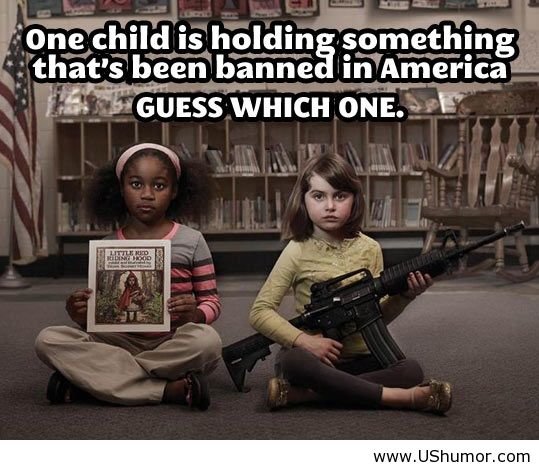One of the most ironic instances of banned books is Ray Bradbury's "Fahrenheit 451," which is all about a future in which books are, by law, ordered to be burned. Bradbury has another short story with the same basic premise, "Usher II," in which two book-loving rebels decide to recreate many well known story plots in a nod to Poe's short story "The Fall of the House of Usher." One of Bradbury's characters describes the philosophy of those who banned the books:
"Every man, they said, must face reality. Must face the Here and Now! Everything that was not so must go. All the beautiful literary lies and flights of fancy must be shot in mid-air! So they lined them up against a library wall one Sunday morning thirty years ago, in 2006; they lined them up, St. Nicholas and the Headless Horseman and Snow White and Rumpelstiltskin and Mother Goose-oh, what a wailing!-and shot them down, and burned the paper castles and the fairy frogs and old kings and the people who lived happily ever after (for of course it was a fact that nobody lived happily ever after!), and Once Upon a Time became No More! And they spread the ashes of the Phantom Rickshaw with the rubble of the Land of Oz; they filleted the bones of Glinda the Good and Ozma and shattered Polychrome in a spectroscope and served Jack Pumpkinhead with meringue at the Biologist's Ball! The Beanstalk died in a bramble of red tape! Sleeping Beauty awoke at the kiss of a scientist and expired at the fatal puncture of his syringe. And they made Alice drink something from a bottle which reduced her to a size where she could no longer cry 'Curiouser and curiouser', and they gave the Looking Glass one hammer blow to smash it and every Red King and Oyster away!"
Image from here
I just find it interesting that this story deals with the banning of all books, not just fairy tales, but how Bradbury alludes so heavily to fairy tales and classic fantasy with all of his examples, when he could have mentioned any of the other wonderful, world-renowned works of literature that exist out there.
In general, we don't really have to worry too much about books being banned, thankfully. Even if a few schools or libraries ban certain books, there are plenty of other ways to get your hands on the same book, and frankly it probably just increases a student's desire to read the forbidden fruit.
Image supposedly from this page although I don't see it??
Yet remember that some forms of banning do occur, even supported by fairy tale lovers, and not without reason. You have to consider age and maturity appropriateness, as many fairy tales really can get quite dark. Many feminists would argue that we shouldn't tell our children the old fashioned versions of fairy tales in which the women are passive victims, in need of rescue by a man. Clarissa Pinkola Estes thinks we should keep anti-Semitic fairy tales out of copies of Grimms, except for those being used for research purposes.
But of course, there's so much room for debate. I completely agree that women should have equal rights and that repeated exposure to a certain stereotype can be damaging even at a subconscious level, and I absolutely believe that racism in any form is wrong. But many fairy tales were meant to be shocking because they were meant to get a point across-to be a voice for the voiceless. And we have to remember fairy tales are also products of history, from times when racism and chauvinism were rampant. It SHOULD be horrifying to imagine a father giving away his daughter to an animal in marriage, as in many Animal Bridegroom tales-because that's how many young girls saw their older, unwanted future husbands. The depths to which Hansel and Gretel's parents sank reflect the poverty many families endured. The "moral" of Bluebeard tells us just how ingrained in people's minds gender bias was. And as horrible as racism is, we can't pretend it didn't exist. Through seeing how dangerous and extreme it can get, it helps us to fight the racism that still exists today.
Again, it's a complicated issue and you have to use good judgement, but many controversial fairy tales can serve as a starting point for honest conversation for children who are ready to think about different issues maturely.
And here's the thing about fairy tales-even if we were to, in the future, become part of a society like Bradbury imagines in which books are banned, fairy tales are extremely resilient. For generations and generations they were passed down by word of mouth, and they are pretty much the only genre to have survived hundreds and hundreds of years in some form and yet still remain known and well-loved by the public (I think religious texts would be the only other thing to fit in this category?). Fairy tales have already survived, despite being looked down on by the upper class in certain cultures, and relegated to the nursery in others, and are clearly not going anywhere.







No comments:
Post a Comment